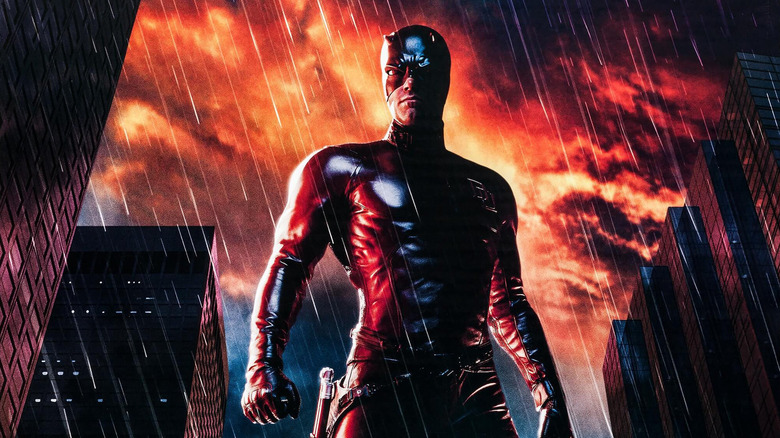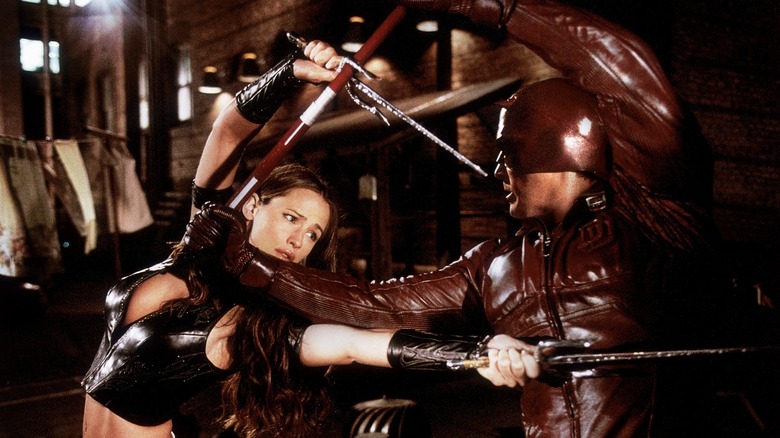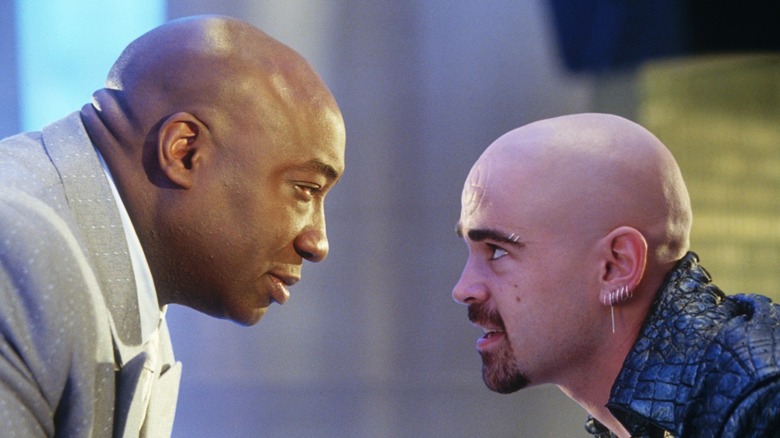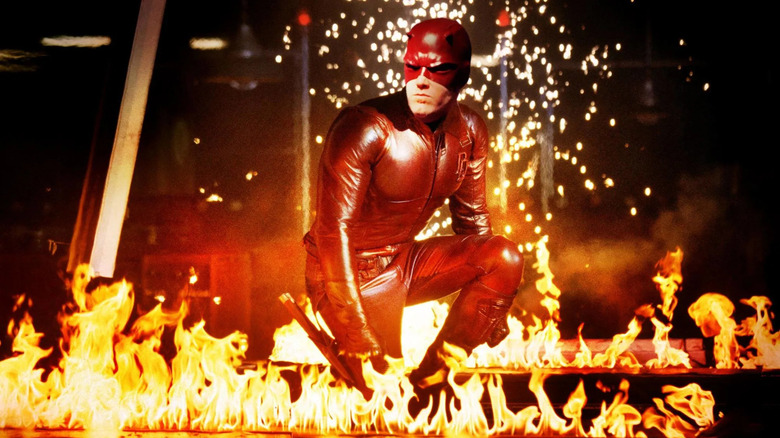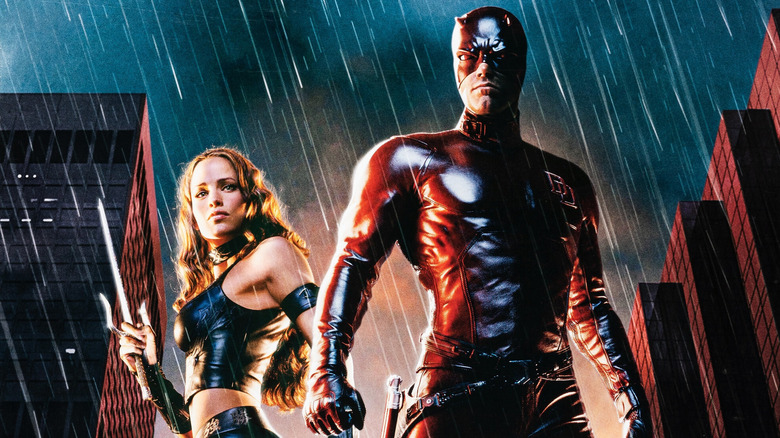Tales From The Box Office: 20 Years Ago, Daredevil Fell Victim To Its Own Ambitions
(Welcome to Tales from the Box Office, our column that examines box office miracles, disasters, and everything in between, as well as what we can learn from them.)
20 years ago, comic book movies were in an odd place. "X-Men" helped open the floodgates in 2000, particularly for Marvel, but it was the absolutely astonishing success of 2002's "Spider-Man" that represented the point of no return. Thus, other superheroes quickly made their way to the silver screen in the years that followed, with mixed results. One fascinating example is 2003's "Daredevil," which starred Ben Affleck as the Man Without Fear, and his future wife (and eventual ex-wife) Jennifer Garner as Elektra. The movie wasn't quite a flop, though not quite a hit, and didn't start a franchise for Matt Murdock like Marvel's mutants and Peter Parker now had. It was an up-the-middle, modest misfire.
The project was originally set up at Sony, by way Columbia, but changed hands to 20th Century Fox. All the while, Mark Steven Johnson ("Simon Birch") was there to usher his "dream project" across the finish line. The filmmaker's Marvel Comics adaptation was billed as a dream project in an era long before Marvel was the dominant force in entertainment — and certainly before Daredevil was an A-list superhero. The film, as we know it, does indeed focus on a lawyer by day, hero by night, who is blind yet has other heightened senses. The plot, rather simply, sees Wilson Fisk (Michael Clarke Duncan) hire Bullseye (Colin Farrell) to kill Daredevil, which ends up putting him in the crosshairs of his own girlfriend, Elektra.
Unfortunately, Johnson's dream project was doomed to be compromised by studio interference and timing. In honor of the movie's 20th anniversary, we're looking back at "Daredevil," how it came to be, how Johnson's supposedly amazing screenplay failed to come through in the final product, and what lessons we can learn from it two decades later. Let's dig in, shall we?
The movie: Daredevil
The movie was originally imagined around 1997 as a $50 million action flick with modest aspirations, relatively speaking. However, "Daredevil" eventually carried a budget near $80 million when all was said and done. That all had to do with "Spider-Man," which became a monster hit in 2002 making more than $820 million worldwide and changed the game for comic book movies in the process. Thus, Matt Murdock's big screen debut could not just be a small-scale action film with a side of courtroom drama and superhero dressing. Johnson, ahead of the movie's release, illustrated how different things were at the time.
"When I first told people that I was making a movie called 'Daredevil,' they would respond by saying, 'Oh, you're making a movie about (motorcycle stunt rider) Evel Knievel?' I was going after this before the whole Marvel phenomenon started. Nobody knew who Daredevil was."
It's not as though the movie lacked the proper source material. It was inspired largely by Frank Miller's legendary run in the comics, including (spoilers) Elektra's death. That run, to this day, is widely regarded as some of the best work Marvel Comics has ever done, particularly "Born Again." Be that as it may, the increased profile of Marvel heroes following "Spider-Man" put this on Fox's radar in a much larger way. It became about scoring a big name in the title role. Guy Pearce and Edward Norton were also seriously considered. Speaking recently with Yahoo, Johnson elaborated on the casting process.
"Yes, they definitely wanted a star because the character was so unknown and they felt it needed the help of a star... There was a lot of pressure, and they wanted a name. It was definitely one of those roles where everyone was being mentioned. There were a lot of people in the mix."
He added that "Ben was a fan of Daredevil because of ['Good Will Hunting' producer] Kevin Smith, so it ended up being him. And then he became Batman!" Indeed he did.
A vision, woefully compromised
Johnson did not lack vision, as he had been planning/hoping to make this movie for years. The double-edged sword of it all is that Fox really got behind the movie, largely thanks to the success of movies like "X-Men" and "Spider-Man." The problem was, it then became something that the filmmaker couldn't impose his vision on, as this was now a franchise play and not just some potentially profitable, mid-budget passion project.
While the movie has (had?) much to offer, including the late Michael Clark Duncan as a perfectly cast Kingpin, and Colin Farrell with a pretty unhinged take on the villain Bullseye, Fox decided to play up the romance between Daredevil and Elektra. That wasn't what Johnson had in mind, resulting in much of his original cut being scrapped. In that same Yahoo interview, he explained:
"One of the bittersweet things is that my director's cut had more of everything, and all of that got kind of condensed. At least a quarter of the movie was cut out, and there was a lot more character development [that was lost]. It's just a more complete movie. Some people love the movie, and some people hate the movie, but almost everybody likes the director's cut."
What's particularly maddening, one would imagine for Johnson, is that the script received very high praise. Producer Gary Foster billed it as "more character-driven," as well as "darker" and "edgier" than other comic book movies prior to production. Again, this was another time. The director's cut of the film surely reflects the praise in some way. Kevin Feige, now the head of Marvel Studios and one of the most successful producers in history, said ahead of filming that they "have one of the strongest comic scripts we've ever had." And Feige has damn well proven he knows what he's talking about.
The financial journey
Given the enhanced focus on the movie as a love story, Fox decided to open the movie on Valentine's Day weekend, representing something of an unconventional move for a blockbuster film such as this at the time. "Daredevil" was met with mixed-to-negative reviews, though a rather robust and varied marketing campaign did its damnedest to combat any negativity from critics. In the end, the studio was left with a result about as middling as it gets.
The film opened number one at the box office with a pretty sizable $40.5 million debut. That number grew to $45 million accounting for the President's Day holiday that Monday. What's more, the movie held well enough to stay on top in its second weekend, taking in another $18 million, with "Old School" barely missing out on the top spot. "Cradle 2 the Grave" would come to end its run atop the charts the following weekend though. "Daredevil" wound up with $102.5 million domestic and $76.6 million internationally for a grand total of $179.1 million. Or, just shy of 2.3 times its reported $78 million production budget.
That left Fox in an odd situation, as it wasn't a full-on flop, but it absolutely wasn't a huge hit either. Rather than go with a sequel, they decided to give Garner a solo spin-off with "Elektra" in 2005. That movie, on the other hand, fully flopped with just $56.9 million worldwide against miserable reviews. Thus, any chance of "Daredevil 2" died right there, and Matt Murdock wouldn't return until Netflix brought us a live-action series a full decade later in 2015.
The lessons contained within
While it is a tough thing to quantify, there is a general consensus that Johnson's director's cut is, indeed, a better film. Sure, Bullseye still looks a little odd, and we've still got the leather suits, but for its time, it is far better than what Fox opted for in the theatrical cut. It was a very early example of leaning into the source material being the way to go ("Spider-Man: Into the Spider-Verse"), rather than leaning away from it (2015's "Fantastic Four"). Even so, Johnson, in that Yahoo interview, shared where he went wrong.
"One of the mistakes I made with the film was wanting to put everything in! I wanted to do Daredevil's origin story, and I wanted to do the Elektra Saga and I wanted to introduce Bullseye and Foggy. I wanted everything to be in there, but the film could only support so much. And then when you're told to cut a half-hour out and make it more of a love story, things start to feel rushed and not quite right. It's a fan thing: when you love something so much, you want to tell it all."
While there are exceptions to these rules ("Avengers: Endgame"), generally speaking, it is best not to bite off more than one can chew in two hours with a comic book movie. Beyond that, Fox really fumbled the ball by leaning way from Johnson's vision and then getting way too ahead of themselves by doing "Elektra" as a spin-off, rather than perhaps doing a sequel and attempting to course correct. It was an early example of trying to build a universe quickly (Sorry, Dark Universe), rather than let things develop naturally. It doesn't work – it has never worked.
